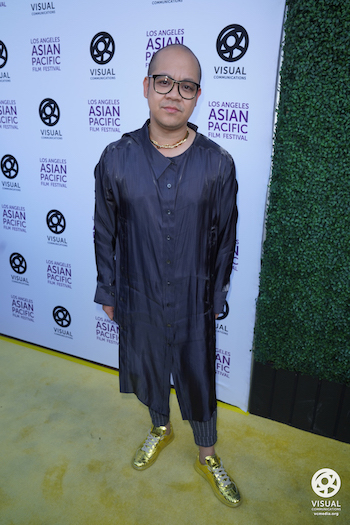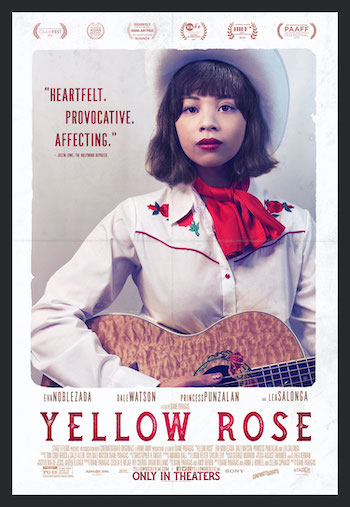Written by Cori Dioquino
“Hey!” I greeted as my Zoom window popped up. I sat down at my dining room table with a large mug of coffee-milk tea and a pack of Yan Yan, my usual mid-day snack.
“Let me grab some water, I’ll be right back,” said Jeremiah Abraham as he got up from his computer desk and disappeared camera-right into his kitchen, brushing by the solitary plant behind his chair.
I observed his living room in the background while I waited, noisily munching on my crackers dipped in chocolate. The reflection of his couch and a lamp showed clearly in the big screen television; dvds and books with what looked like a record player were organized neatly on a shelf underneath. Ah, business meetings during the time of COVID, a.k.a. glimpses into everyone’s personal life.
“How are things with you?” he asked, returning to the computer, glass of water in hand.
“They’re good!”
We proceeded to catch up; I lamented about my acting career woes and he vented about his nervousness as he prepared to moderate a panel discussion for the New York Asian Film Festival the next day.

Jeremiah Abraham at the 2019 Los Angeles Asian Pacific Film Festival – Opening Night World Premiere of Yellow Rose. (Photo by Steven Lam.)
Though this wasn’t the first time I had video chatted with Jeremiah, it was the first time we had ever hung out (virtually) one-on-one. We met back in April, when I was on-boarded by a mutual friend to join the Unapologetically Asian launch team – a movement that he co-founded with Filipino American Broadway actress Diane Phelan. As we conversed, it dawned on me how little I actually knew about Jeremiah Abraham. Outside of team meetings, group texts and comments on one another’s Instagram photos, we’d never actually spent time together. Required COVID-19 lifestyle changes haven’t encouraged that initiative either, especially as he is currently in New York City and I am in Baltimore for the time being.
Ten minutes into the discussion and we were venting about the lack of proper Filipino stories in film and television.
“We’re always devices or vessels to uplift someone else’s story,” he says. “That’s why I really cling to projects like Lingua Franca and Yellow Rose, because they’re actually putting Filipinos at the forefront, [for] one. Two, [they’re] portraying Filipinos in a very layered way. I found that, a lot of times, with Filipinos and Asian Americans in films it’s always ‘Culture, culture, culture’, and then maybe you’re interested in someone as a person. I don’t want to be watching a movie about a Filipino and all they’re talking about is….”
“Lumpia?” I cut in, laughing.
“Or Tsinelas or dancing Tinikling,” he continued, not missing a beat. “Why can’t I just watch a good, layered story which is centered on Filipinos or Filipino Americans and you’re not shoving culture in my face every five seconds? It’s critical and important, but it’s not the only thing that we are.”
I wholeheartedly agree. In most Western films or shows that present Filipino characters (or any characters from marginalized communities, for that matter), the culture rather than the person often turns into the main character of the story.
“I don’t go through my daily life talking about Ube and Lumpia…”
“You don’t?” I teasingly exclaim.
He smiles, picking up on my joke (because we Filipinos really do love our food). “I mean, maybe I’ll spend a few hours [talking about it],” Jeremiah quips. “The heritage that was instilled in me helps my thought process and helps me make decisions about my life, but I’m not walking around carrying a bamboo stick everywhere I go!”
We continue to joke about atrocious Asian stereotypes, diving head first into the topic that we both came to discuss: Representation.
“I’m not good at following someone else’s dream.”
Jeremiah Abraham
“Twelve years ago I started this website called BakitWhy.com to help uplift Filipinos, but also to uplift their accomplishments, their lives and their interests. I wanted to show a multi-layered view of what Filipino America is instead of us being seen as new immigrants. ‘Cause we’re not new. We’re the first Asians to ever settle in North America.”
“Yeah, people don’t know that. And they don’t know about the connection between Filipinos and the slave trade,” I add.
Not-so-fun fact: In the sixteenth and seventeenth centuries, Manila was a center for transpacific slave trade. And what most don’t realize is that some Latin Americans have direct ancestry to Asia as a result of European tradesmen kidnapping Asian children and selling them into slavery in the Americas. It’s a part of American history that often gets left out of our textbooks when addressing the presence of Asians, and especially Filipinos, in America.
“I didn’t realize that Filipinos first settled in Louisiana because they escaped those [slave] ships,” Jeremiah explains.
As the conversation evolves, we share with one another little tidbits of Filipino American History that we’ve learned through years of self-education. It’s fitting, seeing as October is Filipino American History Month. Before we know it, we’re laughing about how Filipinos have more in common with Latin Americans at times than they do with other Asian Americans and wishing that people talked about these commonalities more often in film and television.
Which brings us back to Jeremiah’s work as a producer.

Jeremiah Abraham with Lingua Franca writer, director and actress Isabel Sandoval.
“So, how did you get your start in the entertainment industry?”
“Oh, you want me to start way-back-when. Okay…” he chuckled.
He humbly obliged to tell me how he started in entertainment. I say “humbly” because for a person who has such a long and impressive resume, he recounts his experiences very matter-of-factly, almost as if they’re mundane details with which he’d rather not bore me. But of course, I find it all immensely interesting.
Unlike most producer origin stories, Abraham began his journey as a computer engineer.
“But I was kind of really bad at math,” he says amused. (Insert dumbass Asian stereotype joke here.) “I thought, ‘I could do this, but maybe I shouldn’t because something might explode if I made it.’”
Having always been interested in entertainment, he wound up with an internship at Disney.
“It set me on a weird path,” he continued. “I worked on some Pixar films and that just got me really hooked. I thought, ‘This is where I want to be.’”
Abraham hustled for the next few years, working full-time during the day and going to grad school at the University of Southern California at night to study digital communication. It was during this time that he was finally able to fully escape engineering.
“I didn’t realize growing up that you could have a job in entertainment. As a consumer you just watch it, but you don’t think about who creates it. You just experience it and then check back into your ‘real life’.”
He continued in communications, working at Warner Brothers full-time. While there, he helped with the company’s early efforts in starting a multicultural outreach. Around this time is when he started BakitWhy.com, “a transmedia content provider that aims to catalogue and represent the diverse and multi-generational Filipino American lifestyle through compelling online content.”
“My mission has always been to uplift POC, especially Asian Americans and Filipinos. That’s why I started BakitWhy. I thought ‘I need to use my skills and do good for Filipinos, whatever that is.’”
Jeremiah worked for several different companies before eventually deciding to start his own.
“I was heading up entertainment for a marketing agency that’s based [in New York] and in L.A. Then, I left that agency, did six months of soul searching, traveled all over and thought ‘this is the time for me to start on my own.’”
Upon his return, he launched Tremendous Communications.
“I’m not good at following someone else’s dream.”
This is a sentiment to which I can relate all too well as both a former immigrant child and present-day American – identities I know he also claims.

Jeremiah at a screening of Yellow Rose.
“So why ‘Tremendous’?” I ask.
“The hardest thing is trying to find a name for your own project. I was thinking about what I wanted to do that’s uplifting to other POC and marginalized people. I felt that ‘Tremendous’ described what we are. We’re big and talented.”
After over a decade of experience in communications and marketing, Jeremiah found the transition into producing to be a natural one.
“I realized that a lot of producing is stuff that I’ve already done as a marketer: strategizing the campaign, marketing things, figuring out budgets…”
“How did you get into it?” I inquire.
“[When I moved to] New York, I reconnected with an old friend of mine, Gigi Dement. She is an amazing producer. She’s one of the first Filipinos to win an Academy Award.”
Gigi Dement, in fact, produced the film God of Love, which went on to win an Academy Award making Dement the first Filipino in history to produce an Oscar-winning film.
“She introduced me to Cecelia Mejia. They both started inviting me to certain things and it just so happened that both of them were collaborating on Lingua Franca. And Cecelia was the lead producer on Yellow Rose.”

Jeremiah Abraham with the cast of Lingua Franca.
It was announced in July of this year that Ava DuVernay’s ARRAY had acquired Isabel Sandoval’s film Lingua Franca, which was later released on Netflix. The story centers on a Filipino transgender woman who is carefully trying to navigate through her life as an undocumented immigrant in Trump’s America. Lingua Franca received high praise from many critics and recently earned Sandoval – who wrote, produced, directed and starred in the film – a best actress award from the Pacific Meridian International Film Festival.
“What I was trying to add to these indie films was a sense of strategy in terms of marketing, partnerships, PR [and] promotions. All those things, I feel like a lot of Filipino or Asian American indie films don’t always have the foresight or privilege to include on the team. I started meeting [with] this collective and community of filmmakers, Filipino filmmakers specifically. I thought, ‘How do I get into this community? How can I be part of it?’ And I realized that’s what they were missing. So I was like, ‘Let me do this for you.’”
In addition to Lingua Franca, Jeremiah’s second film project – the much anticipated Yellow Rose, written and directed by Diane Paragas and starring Broadway legends Eva Noblezada and Lea Solonga – was released in movie theatres this month, just in time for Filipino American History Month. Like Lingua Franca, the film addresses issues around immigration. Yellow Rose focuses on the life of a young girl (Noblezada) with dreams of becoming a country music singer, but suddenly finds herself in a crisis following the unexpected deportation of her mother.
Abraham’s unanticipated path into producing couldn’t come at a better time. Since the success of productions such as Crazy Rich Asians, To All The Boys I’ve Loved Before and Mindy Kaling’s Netflix series Never Have I Ever, Asian American representation in film and television has been steadily on the rise.

Yellow Rose poster
“If you compare the way Filipino American representation is today from three years ago, it’s really different. Now, you have films like Empty by Design and The Girl Who Left Home. We’ve been fighting for where we are now. But three years ago, my mind was so blown. I didn’t even know that these projects existed.”
He’s now working on several projects as the producer, continuing his mission to bring Filipino stories to the forefront of American film and television.
“I can’t go into specific details. But I’m working on more stories that help uplift Filipinos and to portray them in ways that are, as we discussed, very layered. I’m developing [films] on my end, but also other filmmakers or writers are coming to me to ask if it’s a good fit.”
I ask him how he feels about his journey into the world of film production. “It’s kind of cool. I’ve always promoted other people’s projects and movies. I never thought I could be the one creating my own narratives.”
Now, his biggest concern is how to organize and prioritize the millions of ideas he has moving forward. “That’s an acquired skill. My brain goes all over the place in terms of ideas and what we could do, what’s realistic. For me, there’s this chaotic voice in the back of my head still telling me to do all those things, but then I’ve filtered it through with logistics, if that makes sense.”
But in an industry that craves more nuanced forms of storytelling and is in desperate need of more Filipino representation, perhaps having a Filipino American producer with a plethora of ideas isn’t a bad thing. In fact, it’s exactly what we need to continue moving forward.

Cast and Crew of Yellow Rose at the 2019 Los Angeles Asian Pacific Film Festival – Opening Night World Premiere of Yellow Rose on Thursday, May 2, 2019. (Photo by Justin Chu.)

